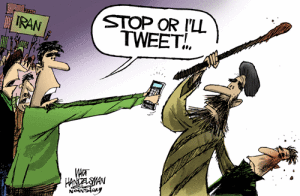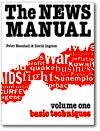DogBitesMan » Featured, General, Journalism » Welcome to journalism-free journalism
Welcome to journalism-free journalism
September 27th, 2016 | Add a Comment
Encouraged to embrace social media, are real journalists now paying too high a price for the convenience of “information everywhere all the time”?
Serious journalists – i.e. those who think news should be fair, accurate and based on facts – have long been urged to integrate social media into their work. It’s a great tool for digging into events and harvesting opinions that might otherwise be “mediated out” by gatekeepers who don’t want inconvenient truths exposed. The so-called “Arab Spring” provided many examples of citizens circumventing the media gatekeepers of oppressive regimes with cameraphone footage, blogs and social media streams. Smartphone videos of police in the United States shooting African Americans have exposed a racism at the heart of America’s justice systems. The social media provide great new, previously unheard of raw material for journalists.
But what happens when ALL the information upon which journalists base their reports ONLY comes from social media? What happens when they simply trawl through Twitter, Facebook, YoutTube, Instagram and all the rest of the social media networks and add nothing from their own research, from interviewing sources and independently checking the substance of their stories?
Well, it starts to look less like journalism, something more clerical – a form of aggregation.
The journalist might write it better, use capital letters and full stops and make sure most sentences have verbs. In their finished copy they might have checked spellings, titles and names.
But what if they end up writing a story based on nothing more than what they’ve read or seen on social networks?
It might look like a short story that appeared in the highly-respected Sydney Morning Herald on 26 September 2016 – a news item with no discernible reporting in it at all.
Of the 20 paragraphs in the story “Users slam #Vodafail after Vodafone outage”, three-quarters were lifted or rewritten straight off unverifiable Twitter feeds and Facebook – including information from Vodafone itself – with the only apparently real reporting being quotes from Riyadh Jamal from Sydney, who told Fairfax Media (the owners of the Sydney Morning Herald) that he and his four other family members were all affected by the outage for five hours.
To be fair, the Herald’s report on Vodafone’s mobile telecommunications outages was not the first or the worst example of journalism-free journalism. And certainly it will not be the last.
As the news industries become ever more competitive, as resources-per-story dwindle, as paid-for newspapers, radio and television are sidelined online by free or borrowed feeds, the temptations to cut corners, “lift” unchecked material and simply construct stories using information-by-the-kilo rather than quality research will eventually leave professional journalism looking like the social media upon which it relies.
Stories like that in the Sydney Morning Herald – written by an unnamed staff member about a relatively small issue on a Sunday evening and hidden deep in their online edition – will proliferate, gradually seeping deeper and deeper into the heart of important journalism.
Just as the reporter behind the Vodafone story seemingly never contacted the company itself, questioned only one customer and never unearthed one fact otherwise unknown on the Twitter feeds he or she trawled – like the actual cause of the outages – one day we may see political reporters or foreign correspondents never visit an parliament or congress, never speak to a politician or an activist, never cross-examine a public servant or an expert, never cross a border or the street, in fact, never get out of their chair or take their eyes off the screen in front of them.
Then what will be the point of having them?
If journalists can produce stories with no new facts, no verification of the information on social media and no attempt to unearth real balance, why would we want to read or listen to them?
If we get nothing better than we can find on social media, any sensible person will just feed off Twitter – a poor meal indeed.
Filed under: Featured, General, Journalism · Tags: African Americans, aggregation, Arab Spring, Facebook, information-by-the-kilo, Instagram, journalism, journalism-free journalism, journalists, news, racism, serious journalism, social media, Sydney Morning Herald, Twitter, Vodafail, Vodafone, YouTube
Recent Comments
- Bernard Sinai on Goodbye Mr Grass Roots
"With the Queen's public birthday coming up I'm just picturing how Rootsie would …" - Phil Ryan on Cheers or tears for SBS?
"I look forward to more productions of similar nature and quality to "The First A…" - Paulo Alberton on About
"Thanks David for the insights... I just discovered you and will explore more of …" - topdog on Endless war between newsroom and classroom
"The problem, Shameless, is that the academics generally see the freedoms and res…" - Shameless on Endless war between newsroom and classroom
"I cant see what the problem is. The academics say they believe in free speech an…"














